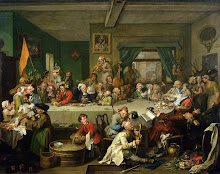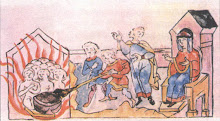I attacked with great resolution the editorial matter, and, reading it from beginning to end without understanding a syllable, conceived the possibility of its being Chinese, and so re-read it from the end to the beginning, but with no more satisfactory result."
-Edgar Allan Poe, "The Angel of the Odd"
The Simply Insane:
*John Evangelist Walsh, "Plumes in the Dust," and "Midnight Dreary." These two books present a sordid alternate universe where Poe fathers Frances S. Osgood's youngest child, Fanny Fay, and dies as a result of a beating administered by brothers of Sarah Elmira Shelton. I have read many poorly-done historical works in my time, on many different subjects. Walsh, however, is in a league all to himself. I do not believe I have ever encountered any books daring to present themselves as legitimate history that contain so many errors, indulge in so many unfounded speculations posing as facts, depict so many fictional scenarios, have so many examples of the deliberate omission of evidence that directly disproves the stated thesis (such as a letter, which Walsh must have seen, which suggests that at the time Fanny Fay was conceived, Mrs. Osgood was in Providence--with Mr. Osgood,) and commits so many sins against common sense as these two volumes. Astounding stuff.
 *Joseph Wood Krutch, "Edgar Allan Poe, A Study In Genius," Marie Bonaparte, "The Life and Works of Edgar Allan Poe," and David M. Rein, "Edgar A. Poe, the Inner Pattern." These are all (with emphasis on the first two syllables) psycho-biographies. The two former books use psychological analyses of Poe's stories and poems to come to the conclusion that he was an impotent basket case who married Virginia (who is depicted as a childlike imbecile) only in order to shield himself from a "normal" relationship with a "normal" woman. The latter uses psychological analyses of Poe's stories and poems to come to the conclusion that he was a frustrated basket case, hopelessly scarred by the loss of Sarah Elmira Royster when he was a teenager--a loss that overshadowed his entire life--who married Virginia the childlike imbecile only because, uh, her mother told him to.
*Joseph Wood Krutch, "Edgar Allan Poe, A Study In Genius," Marie Bonaparte, "The Life and Works of Edgar Allan Poe," and David M. Rein, "Edgar A. Poe, the Inner Pattern." These are all (with emphasis on the first two syllables) psycho-biographies. The two former books use psychological analyses of Poe's stories and poems to come to the conclusion that he was an impotent basket case who married Virginia (who is depicted as a childlike imbecile) only in order to shield himself from a "normal" relationship with a "normal" woman. The latter uses psychological analyses of Poe's stories and poems to come to the conclusion that he was a frustrated basket case, hopelessly scarred by the loss of Sarah Elmira Royster when he was a teenager--a loss that overshadowed his entire life--who married Virginia the childlike imbecile only because, uh, her mother told him to.I have used psychological analyses of these three books to come to the conclusion that these authors really, really should have found other lines of work and given poor old Poe's psyche a break.
A postscript: I was thinking of adding some commentary on the many novels that feature Poe as a character, but the subject is too depressing. Except for Harold Schechter's highly enjoyable series of murder mysteries that star Poe as an amateur detective, I have yet to find one fictional work about Poe that is even readable. I've probably seen every novel there is about Poe, and trying to classify them all into various levels of "godawful" is just too much for me. Suffice to say they all seem to fall into three categories. In the first, Poe is Roderick Usher come to life, a dark, tormented character out of his wildest fiction, and bearing not the least resemblance to any human being who ever lived. (I'll never forget--although I sincerely wish I could--the novel that included a scene where Poe has an orgasm over Jane Stanard's corpse.) The second category are the novels such as Rudy Rucker's "The Hollow Earth," and Stephen Marlowe's "The Lighthouse At the End of the World," that feature a character bearing Poe's name, but otherwise are works of open fantasy that have no connection with his actual life, or oddities like Matthew Pearl's "The Poe Shadow" (a perfect example of what Poe would call "easy writing and hard reading.") The third--which are perhaps the worst of the lot--present themselves as straight biographical novels. They inevitably depict Poe as a perennially drunken, sexually frustrated, deeply unlikable, bumbling, and rather pitiful creature. To top it off, not one of the books in any of these categories ever portray Poe as someone intellectually capable of writing a shopping list, let alone "The Raven" or "Eureka."
 It's amazing how the only thing more painful to read than a typical Poe biography is a typical Poe novel.
It's amazing how the only thing more painful to read than a typical Poe biography is a typical Poe novel.

















No comments:
Post a Comment